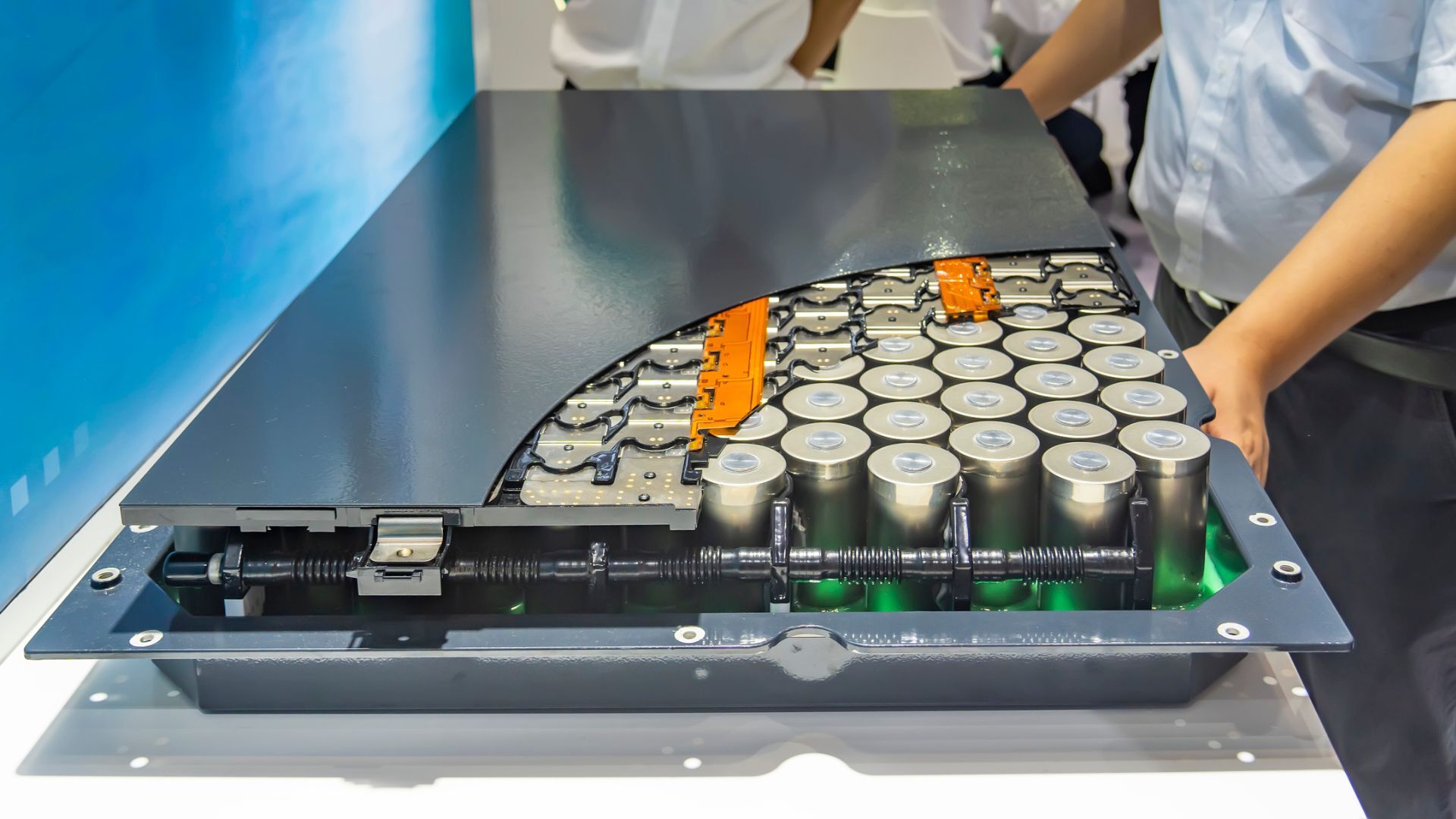I swear I read about how some companies have managed to come up with some break through to charge or increase battery capacity every few months, yet these are never make it to market.
Cold fusion is right around the corner!
Cold fusion is right around the corner!
i thought they’re already at “triple cold² fusion++” ;-)
yet these are never make it to market.
my personal favorite (but not a battery) were two different fake news about fans without any moving parts, one with electricity, conductors and shapes only, the other using ultrasonic somehow, how cool were these lies !!!
https://www.itnews.com.au/news/silent-microchip-fan-has-no-moving-parts-106236
“RSD5 is the culmination of six years of research by Dan Schlitz and Vishal Singhal of Thorrn Micro Technologies”
“Six years of research”, such a cool “product” and now that linked thorrn domain is for sale, how bad!! the world will never profit from their super “cool” invention !!!
“today” other bladeless fans (based on ultrasonic freqs) were anounced: https://linustechtips.com/topic/1471374-not-a-big-fan-new-solid-state-cooler-can-blow-air-with-no-moving-parts/ (“Frore is expecting to start shipping units in Q1 of next year.” which was news from 2022) but did you hear about that cool product beeing shipped yet? i would have, i’m somehow sure, but somehow i didn’t. maybe the “units” they wanted to ship were just something else *lol That article also says: “Frore Systems hasn’t announced any actual computers featuring its Airjet solid-state coolers. But the company is already in partnership with the likes of Intel […]” no actual result, but already partners like intel (intel, how does’nt that already fit !!)
The same nonexisting effect (fan without moving parts), abused (at least) twice. (i’ll just ignore those “bladeless fans” here that officially just have hidden “propellers”) but military says “twice” is already a scheme…
why should it be different for batteries?
if they produce batteries THAT good, they would never sell them but make them available only for rent, to maximise their(!) ROI (and not yours). so i guess it’s yafn - yet another fake news. i might still be wrong however, but i also like to be on the safe side of predictions ;-)
a theory: the richies offsprings startups desperately need other lies than their parents and grandparents who already used up nearly all language-allowed possible lies (as well as nonverbal lies, just watch tv for a while to see it in action) to distract people, companies and govs to ‘invest’ in them instead of i.e. in the future or in the nation, thus new nonexistant technologies is what the richies offspring found best to be their lies about.
Cold fusion certainly isn’t.
That’s the joke
The joke is fusion energy is just around the corner.
Cold fusion is a totally different topic.
Yes agreed.
But: Battery capacity, charging and discharging speed, price has dramatically moved in the last 20 years.
So while it’s easy to disregard revolutions, evolution has most definitely occurred. And many of them are fuelled by what gets hailed as a revolution and then, quietly, sneaks into the current production processes and makes it to market.
How viable would something like this be for powering a home? Solar panels+this?
Sodium will probably be better when it becomes more available.
Exactly. I have a lot of space in my garage, not as much in my car.
Not very. There’s a different sodium based battery being designed for home storage. Not nearly as energy dense, but will last a very long time, can be left outside the house, and uses cheap components (no lithium or other rare metals).
That’s the battery you’ll want.
These are gonna be hella expensive for a while. If space is not a concern there’s much cheaper batteries out there. You don’t really need fast charging capabilities either.
In a home, power density doesn’t really matter. If a battery is large and heavy, you still only transport it twice. Once new, once when you replace it.
Let’s hope it’s better than most Samsung products
It comes with their version of a calendar installed and it wont charge unless you grant it permissions to access your gps log, at which point it will crash.
Seriously, why are they so absolutely shit at software. It boggles the mind.
Their batteries are usually top notch. If you’re hunting around for 18650 cells–which are notoriously bad for fake claims on Amazon and Aliexpress (“80,000mAh!!!” when the best 18650 cells are closer to 3,500mAh)–a genuine Samsung cell is a safe bet.
Samsung was very transparent about their fuck up with the note 7. The article you linked makes it very clear it was a connection issue or a different manufacturer. At this point this is equivalent to the burn banana peels to get high or you eat dozens of spiders while you sleep internet lies.
It’s not a lie, they screwed up twice. I don’t care if it was another manufacturer that screwed up, at the end of the day, Samsung is responsible for QA on anything they sell.
That said, they were very transparent (hence why I linked it). However, I still don’t trust Samsung for other reasons:
- their refrigerators have a horrible repair track record
- Samsung Smart TVs spy on you
- they steal your aftermarket parts
- Samsung is the largest chaebol, so I expect them to not play fair
They do make some high quality stuff, but I generally avoid them because I don’t trust them (I do have a Samsung “dumb” TV, and I may get a Samsung washing machine). I don’t think their batteries will explode again, but they’ll probably do something like make it difficult for independent repair of their batteries. They’re actually better than most in their phones, but that’s a pretty low-value repair vs for cars.
Mostly agree, I hate Samsung in general (sent from Samsung Galaxy S22). Anytime I see someone considering their appliances or TVs I try to turn them to something else. They have made the best batteries for a long time though. I hope a competitor rises to squish them a bit.
Don’t buy a sumsung washer. I only buy used washers and dryers because I’m cheap and handy. Samsung is not an option because a large part of the user market is broken in a way that costs the same as buying new.
I do sort of disagree with your QA comment. Everyone seems to think QA stops once you sell a product, but it doesn’t. They did a full recall to fix their quality mistake. It’d be like if Tesla finally recalled all of the cybertrucks for sucking as much as they do. Massive PR hit to attempt to maintain quality.
Idk, this was after they were banned by the FAA, so I don’t think it was a “PR hit to attempt to maintain quality,” I think it was to stem the damage. The Note 7 was already in the news by that point, and 3 major airlines had already started telling passengers to turn off their Note 7s specifically. The second set of devices failed even when powered off.
Here’s Time’s timeline of events if you want to revisit it. I can understand the first not being caught, but Samsung should have been extra wary of the replacement devices. But no, they only stopped after even more bad news came out.
If Samsung really cared about maintaining quality, they would’ve taken more than a month to test and ship fixed devices. They should’ve done a total recall and relaunch a few months later, once they have thoroughly tested their products.
And thanks for the warning about Samsung washers. I have an LG now, and this is the second time the logic board has had an issue in the 10-ish years I’ve had it (this time it’s a sticking relay), and I’m debating repairing vs replacing it. The part is something like $100, but I’m thinking there’s a chance something else could die given its age. Then again, $100 is totally reasonable if it lasts another 5 years. If you have any recommendations for brands, I’m all ears.
I went with Speed Queen for laundry machines. If I recall they have three models: a 3, 5, and 7, with a warranty of the same number of years (I got the 7). They’ve been mostly solid, but we have had some issues and I like that they are made to be serviced instead of thrown away and replaced. I’ve heard Maytag’s commercial line is similarly made to last.
Better in what way?
Well my $1800 phone has push notification ads for mobile games I can’t disable because Samsung flags the Galaxy Store as a system app so you can’t disable notifications. You can see here that the option is greyed out.

They also install shitty games with “security updates” every month or so.
I’m so glad that the launcher I use has a “Recently Installed Apps” button at the bottom of the apps list. It makes it so easy to go through and scrub the bullshit they install on my phone.
Use ADB to disable Store and AppCloud (adware/nagware that should be killed with fire). No, not the notifications, the apps themselves.
It’s ludicrous that my phone costs more than 2 different cars I’ve owned and I have to go through this kind of bullshit so they can make another 15 cents on average per user.
so why would you buy an $1800 phone if you can’t root it and load some FOSS on it?
Because I don’t want to lose my warranty on a phone with a soft plastic foldable screen.
Yeah, denying warranty for rooting is technically illegal, but knowing that doesn’t do anything for me.
So you want the batteries to not show ads? I don’t understand. Do you have any actual relatable issues between the batteries and other products?
How about the time they had to recall their flagship phones because the batteries were exploding and ended up being banned by the FAA?
So they changed our all the batteries, and re-released the phones, only for them to start blowing up again?
When 2 different manufacturers both have a design catching fire, it’s the design that’s the problem.
The first was a design issue, the second was a manufacturing issue. Both should have been caught by Samsung’s QA.
Nova Launcher and set the first page of the app drawer as empty. Then when it does that, you see them and can uninstall. Samsung is trash, but I also don’t care if I drop my phone in the ocean, cause it isn’t $1400…so a trade-off.
Never seen those before on my Samsung tablet.
It’s been really bad recently on my Fold 3, but didn’t start happening until about a year after I got the phone.
I think they wait for all the reviews and “1 year updates” from the YouTubers to pull this shit.
They honestly can’t make that much off this bullshit on a per-device level. My phone costs more than 2 cars I’ve owned, and I could just buy a Pixel Fold next upgrade, so it wouldn’t take a huge percentage of users jumping ship to mage or more costly than profitable.
If MKBHS, Linus Tech Tips, etc called them out in their reviews of Samsung devices it would stop overnight.
You can kinda turn them off if you silence it like I did

There’s actually a way to kill them, but it’s super hidden.
You have to go to the phone notification settings, go into advanced settings, select the option to disable notification categories per app, then go back into notification settings, open the app list, open the three-dot menu and select system apps, then find the Galaxy store, then select categories to disable.
Easy, right?
hmm, so… I had the notifications category set to on. by doing this, I could see the different categories, so I think you have to have it on to select the correct categories instead of switching it off like you said.
HOWEVER, check this bullshit out:

I can’t turn important updates off, and there’s one they don’t even let me see. wtf!! I wish there was another company that did folding phones as good as Samsung 😢
Am I the only one who thinks this is complete overkill? 49/52 weeks a year, I never use more than 15% of my battery on any given day. I don’t need 600 miles of range, heck, 400 with a nine minute charge would be incredible. Basically drive 4-5 hours then stop for a bathroom break or bite to eat then keep going.
Am I the only one who thinks this is complete overkill?
You might be the only one that thinks this is overkill.
49/52 weeks a year, I never use more than 15% of my battery on any given day. I don’t need 600 miles of range
Then this doesn’t sound like you fit the use case, which is fine of course, but there are many that do.
- Delivery drivers that may have to go to far places without consistent EV charging
- Winter battery penalty. That 600 miles may be 400ish in extreme cold which many people on the planet live in for at least part of the year.
- Heavy loads vehicles. The 600 mile number is used for the basis of comparison to today’s passenger sedan EVs. When putting these in heavy trucks, that 600 mile number may be cut down to 300 or even 200 miles, which opened up new avenues for EV heavy goods deliveries.
In short. Its not just about you.
Then use the same technology to make a 300 mile battery that’s half the size and weight.
600 miles of range is amazing, plus you have to realize that it doesn’t always keep that 600 mile range. Also most people don’t charge their battery to a 100%, for longevity they only charge up to 80% for the health of the battery
Amazing, now we just need charger infra to be more ubiquitous
That’s the main thing holding EVs back in general, in my opinion. That, and the price of EVs. Batteries will get better with time, chargers will get faster. But if there aren’t enough fast chargers all over the place like petrol stations, then the adoption of EVs will be too slow for prices to drop significantly until ICE vehicles aren’t supposed to be produced anymore.
Also, I hope the electronics industry really gets their shit together in terms of recycling and sustainability.
How much is that in loading cable diameter?
Now we’re getting there!
now tell me why it isn’t sustainable
Because carrying a 2-ton metal box around you for every single trip you want to do is the least efficient possible way of doing so. Walk places, ride bikes, take trains, minimize car trips and promote carsharing for the occasional trips where cars are actually necessary.
I literally can’t walk to anything, I live in the woods.
56% of humans live in cities, and this is increasing over time. It’s cool that you’re the exception who lives kilometers away from the nearest store (poor planning in your village though), but the reality is that by proper city-planning and good public transit investment, most people wouldn’t even need to have cars at all.
I don’t live in a city, I live outside of one- they don’t block off the land around here and say you can’t live on it. I’m not interested in living in a city- I have a couple of acres, gardens, old oak trees towering all around giving me shade, I’m near a lake where I can go boating, I have space for my camper and garden tools. I’ve lived in apartments and townhouses, and when you live right next to work, then yeah, walking across the street to your job is great, but if you want something more than 1000sqft for your family and dog- you find yourself outside a city.
On the flip though, I can work from home so I drive a lot less than many, and our groceries are delivered so there are efficiencies gained by a single vehicle delivering to multiple homes instead of each making a trip.
And furthermore, I have enough space to put in a large solar array which I’m currently looking into. If I ever get an electric car, I’ll be able to charge completely off grid with green power. All of that is tougher crammed in a high density urban environment where you’re at the mercy of infrastructure out of your control.
Please tell us how environmentally friendly bringing infrastructure like internet, roads, electricity, water or garbage disposal to low-population density areas is, and how resource-efficient single family houses are. Go off living your happiest life, mate, just don’t preach about the sustainability of it when your eco-footprint is twice that of a city dweller.
As advice: for solar panels to charge an EV, you’re gonna need a fuckton of them. An EV battery is easily 50kWh, which means a 10kW solar installation producing full energy for 5 hours (assuming perfect efficiency on conversion). So be ready to buy a lot of panels.
Well I’m on well water, and I live near Amazon data centers so power was already close by at large scale. I have a septic system, so there’s no sewage lines. Internet is fiber, also already here because of Amazon and it runs on common telco lines that have been there 100 years and uses almost no power for transmission. As for solar, whole home solar arrays are common in my area, I could probably fit 30-50 panels on the sun side.
I’m not arguing that it’s more sustainable, just that endless population growth crammed into mega cities isn’t a great solution either- I think smaller communities with some measure of independence is probably more sustainable than city sized archologies with people crammed in coffins- that’s no way to live. With fewer people the slices of pie can be bigger. Cities use an unbelievable amount of concrete for infrastructure which is a huge pollutant and a finite resource due to the limited supply of special sand required.
There’s no easy solution- I’m just saying for many, it’s not as simple as just taking a bike. I feel like reducing heavy industry and global population and making Chinese trash products illegal would have a far greater impact on global sustainability, as those things use orders of magnitude more energy and resources than every country dweller’s cars combined. And don’t get me started on energy hungry crypto and AI farms- they use more power than the bottom 10 countries combined.
Industry has done a great PR campaign making people feel guilty and personally responsible while generating billions of tons of plastic bottles, bags, and packages which are 90% not recyclable regardless of the blue bins. Small changes at industrial scale would have far greater impact- like switching back to glass bottles or waste fiber bags. Not to say we shouldn’t each do our part, but we as individuals carry an unfair share of the blame for problems largely created by unregulated profit driven enterprises.
Well I’m on well water, and I live near Amazon data centers so power was already close by at large scale. I have a septic system, so there’s no sewage lines. Internet is fiber, also already here because of Amazon and it runs on common telco lines that have been there 100 years and uses almost no power for transmission. As for solar, whole home solar arrays are common in my area, I could probably fit 30-50 panels on the sun side.
I’m not arguing that it’s more sustainable, just that endless population growth crammed into mega cities isn’t a great solution either- I think smaller communities with some measure of independence is probably more sustainable than city sized archologies with people crammed in coffins- that’s no way to live. With fewer people the slices of pie can be bigger. Cities use an unbelievable amount of concrete for infrastructure which is a huge pollutant and a finite resource due to the limited supply of special sand required.
There’s no easy solution- I’m just saying for many, it’s not as simple as just taking a bike. I feel like reducing heavy industry and global population and making Chinese trash products illegal would have a far greater impact on global sustainability, as those things use orders of magnitude more energy and resources than every country dweller’s cars combined. And don’t get me started on energy hungry crypto and AI farms- they use more power than the bottom 10 countries combined.
Industry has done a great PR campaign making people feel guilty and personally responsible while generating billions of tons of plastic bottles, bags, and packages which are 90% not recyclable regardless of the blue bins. Small changes at industrial scale would have far greater impact- like switching back to glass bottles or waste fiber bags. Not to say we shouldn’t each do our part, but we as individuals carry an unfair share of the blame for problems largely created by unregulated profit driven enterprises.
you’re the exception.
Gas-holes will tell you that the rare metals leak poison into dirt.
As if gasoline isnt already doing that.
They aren’t. They’re doing it right and into the air you all will breath and bake in for the rest of your, now short, life, suckers.
I posted about this a week ago. The battery pack will likely be around 150kWh (Nio has a solid state battery car that will be produced that can do 577 miles on a 150kWh battery). The 9 minute charge is from 8-80% (according to the marketing material I dug up) so it is 432 miles of charge in 9 minutes. Considering fast charge costs like $0.50/kWh currently, I’m guessing most people will not be charging up that entire portion unless they are planning on driving for a long fucking time…after they have already been driving for 9-10 hours.
But that charge rate would have to come from a charger that can output much higher than current ones. The highest output you are likely to find is 350kW which would take 18 minutes to charge that 108kWh. So while this battery can charge that fast, you are not likely to be able to find a charger with that high of output for a few years. Still great to be able to get a couple hundred miles of range in 9 minutes. Solid state batteries supposedly have a quicker ramp up period and can take the full output for a higher percentage of the battery.
Your math checks out.
Charging a 600 mi battery in 9 minutes would require a charging station that can output somewhere north of 1.2 MW.
We need major upgrades to the electrical grid as well as doubling our electricity generation capacity for charging stations and vehicles like that to be common place.
You know, with charge times like that I wonder if roadside attractions will become more popular again.
Maybe I should start on the next worlds largest rubber band ball now.
Well most people are not needing to add over 400 miles when they charge up. That might be the case once a year for occasional families but most will be looking to add half that which is not much more time than it takes to fill up with gas. It might cause charging stations to offer more amenities. Or maybe the government could get off its ass and make it okay to put them in at rest stops, there wouldn’t be much of a problem at all.
Does fast charging reduce the lifespan of a battery like this? The headline is bothersome because my suspicion is it won’t last 20 years if you fast charge all of the time and whatnot. I realize that’s not a typical case but it’s good to understand the trade-offs.
The chemistry is substantially different, so we’ll probably have to wait until scientists run some tests to get a more precise set of parameters that affect degradation. I expect failure modes like dendrites are basically impossible with solid-state, but electrode cracking is still possible. There might even be new and exciting ways they can degrade! Regardless, this is still great news.
Engineering Explained has a good summary: https://youtu.be/w4lvDGtfI9U (Piped link: https://piped.video/watch?v=w4lvDGtfI9U)
Honestly, we do that. Almost every year we drive for 13-14 hours to visit my parents, which is something like 900 miles. We usually do 300-400 miles then refill gas and grab some fast food. We usually stop twice on this trip, sometimes three times if someone has an emergency. We also do some shorter 600 mile+ trips as well (in-laws and sibling are just over 600 miles away), and frequently drive ~200 miles, so we usually have 1-2 road trips each year.
Current EVs that get something like 200-250 miles per change would require at least four stops, and 30min or so per stop, which would add at least 2 hours to the trip. That turns a one-day drive into a two-day drive, and probably three days if charging stations aren’t readily available. For the shorter trips (just over 600 miles), we’d still need to recharge at least twice, which adds more than an hour to the trip.
So I’m absolutely interested in this kind of range. I don’t need 600 miles, but 400-500 would be good. Until they’re affordable, we’re sticking to our ICE family car, though we’re planning to exchange our hybrid commuter for an EV.
That is the case for some people but cases like that are pretty rare. There is no way I could do a drive like that. Current EVs are fine for the vast majority of people but there is the rare family that makes 900 mile trips once our twice a year. For those instances like yours, I’d suggest renting an ICE one or twice a year if you wanted to switch to an EV for your larger vehicle or get a plug in hybrid.
Definitely swap out that commuter car. A used Bolt is pretty darn cheap. I did some math and replacing our Prius C with one would save $1200/year in gas costs. And then there are oil change costs that you save and a few others.
A used Bolt is pretty darn cheap
Yeah, I’ve been looking at them, and it’s something like $13k, which is definitely in the reasonable range of prices, especially since I can probably get $5k for my current car.
However, I’m worried about battery issues. People claim it’s fixed, but I’ll be parking mine in my garage and there’s a lot of flammable stuff in there. So I’m a little hesitant. I don’t need to ever fast charge it since I only drive like 200 miles per week (and never more than 100 miles in a day, usually like 50), so trickle charging should be totally fine. If I can confirm that, I might just do the swap. Or maybe I’ll get a Leaf, which is in a similar price range used.
Our gas and electricity costs are pretty low ($3.50/gal and $0.12-0.13/kWh), so even at $13k, the Bolt would still need ~10 years to pay back for itself (and that’s not counting the opportunity cost of investing that money). I’m still tempted based purely on the convenience factor (never needing to go to a gas station again), but it’s not a slam dunk yet. If the car dies, I’ll certainly replace the commuter with an EV though, I would just rather avoid the hassle of listing and selling my current car.
From a purely climate perspective, it’s probably better for me to replace our family car. We get ~20mpg, and hybrids would get 30-40mpg, and a plug-in would get emissions-free for most of our around-town trips. That car is only used for very short trips (<20 miles) or long trips (>200 miles), with almost nothing in-between. But those cars are super expensive right now, so I’m watching the used market to see if I can score a deal.
I would advise against a Leaf, especially used. Nissan was great at getting a popular, cheap EV out the door but they have completely stagnated since then. The Leaf’s big issue is that the battery is air cooled. That’s fine if you live in Hawai’i where the temperature is in the 70s year round but places that experience heat will see a severe degradation in range relatively quickly. It’s not unheard of fire a 10 year old Leaf to only get maybe a dozen miles of range. There is also the fact that it uses CHAdeMO instead of CCS for fast charge. They have finally started to make adapters but they are $1000 and are not officially supported.
If you are indeed worried about a Bolt battery, you could always park it outside. There is not a catalytic converter for thieves to rip off so being out of a garage is not a big issue in that regard.
I would agree that switching will likely not make a ton of sense for you. Thankfully in my state, they offer a rebate for EVs on top of the federal credit so a used EV for us would pay for itself in about 5 years.
Or maybe I’ll get a Leaf, which is in a similar price range used.
If you will EVER need to fast charge then the leaf is going to be more annoying because it has CHADeMO and not CCS
Get the bolt unless you’re certain that’ll never be a problem even once, it’s seriously not worth it anymore
Source: longtime happy leaf owner who hates CHADeMO as it cannot be easily converted to CCS like NACS can
That’s a long day in the car, too much for me. Any road trip over about 350 miles gets me pretty exhausted and sick of being in the car. So I’d be OK with a 300 mile range and stopping overnight at a hotel with a charger nearby for trips like that.
There are already some charging stations in Germany offering 400kW. Still 16 minutes though. 800kW is just insane. CCS is currently capped at 500kW, so you would need MCS which is planned for trucks.
If you do the math, the common standard plugs simply can’t do the charging rates that would be required here. You’d need a whole new plug design on top of all new chargers.
It’s also silly and unnecessary. We should focus on getting more chargers out there, not chasing a fast charge time goal. If you plan your route out a bit, 20-30 minute charge times every 2-4 hours are fine for the vast majority of people.
https://wumpus-cave.net/post/2024/03/2024-03-30-ten-minute-ev-charging-wont-happen/index.html
According to this: https://en.m.wikipedia.org/wiki/IEC_62196 the standard was updated in 2022 to support up to 1500V and 800A. If this can be achieved simultaneously it would be 1.2MW.
Whether it is necessary or realistic is another thing, but seems to be achievable without even changing the plug.
Fucking hell, imagine the requirement of a couple of megawatt substation for fast charging, urban power planners must be shitting themselves.
Urban probably isn’t too bad, if it’s a proper city they already have power for the infrastructure of subways, lighting, and large buildings.
Where it’s going to be tough is putting these in the ‘burbs or the large areas of mostly vacant interstate. There’s just no infrastructure for them to build off of, and EV charging infrastructure is already one of the issues holding people back from more widely adopting them.
Many rural areas honestly would not be too bad since power plants are usually out there. Those generally tend to have pretty decent power infrastructure. It might be different in other states though. Here in Washington dams and wind farms tend to be pretty far out of town.
Yeah, just the random added load equivalent to 80-100 houses per car, any time between 5am and 9pm would be enough to send local suburban grids into a spin, especially in summer evenings when there’s peak loading already underway. A lot of infrastructure would need to be beefed up to make it reliable.
We have an EV that charges on 110v current. It’s not fast, but plugged in the previous evening it will be ready to go by morning. Not a huge draw on the grid off household current. Obviously, just like you point out, more EV will increase demand…but charging off 110v overnight isn’t going to be as demanding as a “gas station” for EV that all want fast charge for people that maybe don’t have charging access otherwise.
I imagine there would have to be some sort of organized system to pick charging time slots via the local electricity provider in order to keep the grid stable. EV owners could certainly get an electrical timer or via the EV manufacturer app to set a charging time.
Yeah if you’ve got home charging it’s not a real issue. We use 240v here in Aus so you can pull quite a bit out of domestic outlets before having to get serious and generally overnight charging to top up the day’s commute would be fine.
So it wouldn’t be a fast charger on every street, and you could always enforce limits by time of use pricing to put a dampener on peak loads.
I just wonder if utility planners might get caught with their pants down on this one. Like, could you say 5 years ago chargers might run to 800kW?
I’d say grid planners everywhere are under serious strain. The demands for air conditioning in public and private spaces are getting higher, the number of household electronics is climbing along with data centers constantly consuming ever more amounts of electricity…now we add EV charging to the mix.
Yeah, I’d say they haven’t been able to keep up.
lol, I am picturing buried thorium salt reactors at charging stations in the boonies.
Replace the gas stations with that stuff and have a charging network distributed around parking areas.
Every car show, they put out ‘concept cars’ that will never see the light of day.
‘New batteries’ are giving off the same vibe.
965 km … so aprox 1000km.
There’s a good chance you are mistaken. It was not specified which type of mile they are referencing.
The only sensible mile to use would be the Scandinavian mile (10.000m). = 6000km range.
Another possibility is the nautical mile (1852m). = 1.111,2km range.
And there are plenty of other “miles” to choose from.
deleted by creator
For the trumpet to affect his height… Did he wear it as a hat?
No. He leans back, and blazes music like a bonfire into the night sky.
So about 1 megameter.
Wow, 1 megameter for a vehicle weighing 2 megagrams. That’s some serious efficiency
Mm!
Hell yeah. Let’s keep going, boys!
What a piece of shit title.
Care to add some substance to your complaint? I thought it was informative and succinct
It would be way more informative if we got battery cycles instead of years, density instead of “600 miles” and max charging power instead of minutes.
Off topic but I learned a new word, “succinct”, thanks!I agree with your comment, but also the title makes sense to me as a non battery person
Actually yeah, I came out unnecessarily harsh
TBF, it fits your username.
Battery cycles doesn’t mean much to a layperson, years, or average years, does.
The weight matters too. EVs are notoriously heavy. You have to haul around the batteries whether they are full or not.
“However, due to their high production costs, these batteries’ initial application will be limited to the “super premium” EV segment.”
The weight matters too. EVs are notoriously heavy.
This is a regular argument against EVs but its a weak argument in the real world application in the USA at least.
-
The most popular EV by sales in the USA is the Tesla Model Y with a curb weight of about 4200 lbs.
-
The most popular vehicle in the USA is (and has been for quite awhile) the Ford F150 Pickup which a curb weight of 4400lbs.
Yes, many of those F150 trucks are used in commercial or heavy duty applications legitimately, However, many are not. The F150 outsold the Tesla model Y by more than 50%. Why is the argument of curb weight only leveled against EVs, the recent addition to the roads, and not giant pickup trucks and SUVs that regularly weigh much more?
.
Personally I like small, lightweight cars because they’re fun to drive and somewhat efficient. Obviously the f150 doesn’t light my fire in that regard, but the model Y isn’t exactly a nimble little thing either. Between weight and annoying tech (screens and driver assist mostly), I’m honestly not interested in modern cars at all
-
“initial” could very well be the key word here. Same goes with any new technology, including the relatively outdated Chevy Bolt design (which was pretty expensive at launch and is now a dime a dozen)
Solid state batteries are more energy dense, meaning that if all you want is 300 miles of range on a charge (perfectly fine with it’s faster charging), then you can have less battery for the same range. Now how much lighter I’m not sure, but it’s in the right direction!
Can’t we get Nokia to make an EV battery instead?
Oh please! I’d love to see Big Oil shrivel and die just like our societies and very planet have under their influence.
They will just take all their oil billions and buy up battery companies at the last moment.
How are they going to convert their assets in that scenario? The value of oil will just go down from here on out, eventually it’ll reach a point where it starts going back up again because it’ll be such a hard to acquire commodity for the few people that want it.
Eventually we’ll get to a point where the only people who use oil are rich people who can afford to run vintage cars and presumably pay some kind of carbon offset tax.
the future is in plastics
And even for vintage cars and stuff, I assume we’ll see better eco friendly and bio fuels being created that could be made in smaller batches without needing to use conventional oil as the fuel. Starting to see more and more of this on aviation already, and even some old warbirds have done recent tests on these fuels and run really well.
Yeah the US Airforce tested all their planes even the stealth bomber on a SAF that can be made from sequestered carbon, they said it passed all tests and that it would be a great way to be fuel independent, they’re especially interested as it seems to look possible to fit carbon capture and processing in a small enough package to fit in an aircraft carrier. Even if manned planes aren’t as useful in future conflicts we’ll likely see drones that use jet fuel replace them.
They can do that with a lot of them, but not all. You can’t really sell an oil platform when nobody is buying oil anymore. The “stranded assets” is a huge motivator for fossil industries to prolong the switch to renewables as long as possible. Problem is the governments being complicit. They could have made clear paths from when on no new fossil investments were allowed to create a proper phase out.
Too bad the lithium battery industry is no better. Those places are child labor slave mines and the environmental damage is astronomical…
You really sound desperate to reject any possibility that hard work and human ingenuity can solve problems. I assume it’s because you’re scared of feeling you have to actually take life seriously and consider the implications of each choice you make.
You’re probably thinking of cobalt or perhaps hard rock lithium mines. Most lithium is just pumped out of the ground as brines, just like oil.
This is true but coal mining is just as bad and requires orders of magnitude (mineral fuels) more excavation than all of the other minerals combined. If we can stop mining coal by using renewables the total amount of mining will be a fraction of what it currently is. Plus many of the other minerals can be reused where coal just ends up as carbon in the atmosphere.
Just take a look where most of these rare raw material resources exist and note what attitude these countries have to the environmental cause. Zero, none. Russia, China, Africa https://www.dw.com/en/how-chinas-mines-rule-the-market-of-critical-raw-materials/a-57148375 I bet they won’t mind destroying whole local ecosystem just to get extra bucks Europe needs
This is exactly it. Of course battery production is harmful too, but not only is it less harmful than other sources to extract, you also don’t have to burn batteries to generate the power. With fossil fuels, the extraction is massively more harmful and then the use itself creates even more pollution.
Trees are technically a green, renewable fuel (if humanity used them that way). The carbon dioxide released is that which was sequestered during the tree’s life.
But oil is gathering material that accrued over vast amounts of time, and using that, dumping huge volumes of co2 directly onto the air. There’s no cycle happening there - just pure extraction for our extinction.
You’re missing the big picture. Firstly because they’re reducing the cobalt requirements in batteries which will massively help. Also long-term lithium and cobalt are metals, they are found all over the place. Oil and coal are products that require life and as far as we know Earth is the only planet in the solar system to have organics like that.
But we can mine asteroids for materials to build batteries. Long before that we’ll have automation to mine the materials on Earth does not requiring human labor. Long-Term this is an improvement it isn’t a zero-sum gain at all like you’re making out
too bad AI is going to fuck it all up long before then
I mean they absolutely will when civilization collapses due to climate collapse and accompanying weather events, famine, droughts, and plagues.
https://www.nature.com/articles/s41467-023-39810-w
I take solace in knowing that they can build all the luxury bunkers they want, but they will one day come to realize they are their tombs, protecting them from the world and species they damned, including for any of their muh legacy nepo babies huddled underground with them, for a couple million years.
I’d appreciate if people just like you would stop taking any solace and tolerating this bs. The ONLY reason this shit continues to happen is because too many people do nothing. Then when asked they get defensive and say, “What am I supposed to do?!” followed by “What are you doing?!” Like guys, you’re smart enough to recognize the perils of these industries, read journals and papers, and internalize the evidence, and you can’t fucking do a quick Google search on activism and even lightly contemplate entering yourself into local politics?
Come now.
I was part of Occupy, and it was mostly the fellow peasants being hurt from this system laughing us off the street. I made phone calls for Bernie’s primaries.
I still vote the least non-progressive out of harm reduction, and will vote for Harris, as I would have for Biden’s corpse, just as I did voting for his corpse the last cycle, and Clinton before when not many showed up. But I no longer have hope. That’s just so I can look myself in the mirror and say I did the right thing in the face of madness.
Good on you if you have hope, rage against the dying of that light. I’ve seen too much to believe that the nobility of the human spirit will prevail.
I was taught a lesson when I was younger that you cannot compare your trauma to that of another. I also learned that it isn’t rage which defines progress, it is determination. Apathy, a loss of hope, quells the spirit and stunts progress. Those not on the Right are especially individualistic. We cater to the spirit of independence, while also celebrating love and community, though always as individuals to individuals. It’s not “I” or “Myself” that makes the change. The shift happens when we step up together and change sets in when there is a united, achievable goal.
In near every recent movement the Left has been a part of with the exception of Bernie, there has been nothing that was clearly defined and clearly achievable. Just a bunch of angry people loosely pointing fingers. FeelTheBern DID work and imagine how things may have been different not if Bernie had been elected, but if we with our strength of spirit continued down a united path. Bernie’s ENTIRE message was never about getting him elected, it was always about us coming together and being active as one.
I’m sad that so many people seem to have forgotten that.
I hear you about the long arm of history, and I might even agree, but not just our society, our species was put on notice we are risking the habitability of our only shared, sole habitat in the medium term a century ago. Now it’s here, it’s accelerating, we are feeling amuse bouche of our reverse terraforming project, scientists are finding new runaway effects their conservative estimates didn’t account for, and still humanity collectively shrugs because we can’t disrupt our global economy short term even to literally have a future for our species. We, the US, are among the leaders in the world in terms of accelerating that destruction.
I likely would have more of an attitude of not for us, for our children if that weren’t the case. But physics doesn’t care that we are the slow learners and selfish fucks. I hold the shame and guilt in my heart for my son’s likely hellish future that I really can do nothing about short of becoming an ecoterrorist which for the record I’m not planning on becoming.
Time is no longer a luxury humanity possesses. We needed to take drastic, draconian, lifestyle altering changes decades ago, and we still aren’t willing to entertain such things today, with shattered heat and earliest cat 5 hurricane ever records.
Exactly why “we” is important. People are struggling and it’s difficult to consider the world when your own life is falling apart.
Unfortunately I don’t have a true solution to this beyond the need for a real leader to step up. Well…there is another solution, though I’d rather not speak of it for fear of ending up on a list. It’s also not one I support. Still, I feel strongly that we can find our way.
At the very least I’m not just going to roll over.
muh legacy nepo babies
Are they actually saying that? The kids or the parents?
Concrete is effective at sealing shut bunker doors, and air ventilation systems, as is caulk
Yeah, but humans are not very effective at organising humans to act in their best interests in a coordinated and logical manner. I feel that this will be even more of a challenge post-collapse. Some bunkers may get caulked. Most will get left alone.












